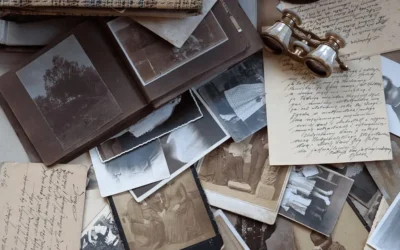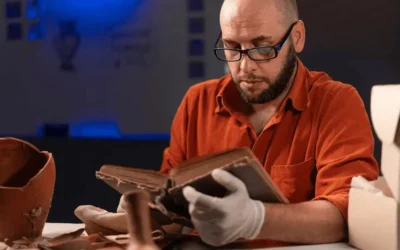Unlocking the Power of Archival Relationships
Margot Note
The role of archivists involves a delicate dance of influence, relationships, and engagement.
One of the critical practices archivists employ is the establishment of advisory boards. These boards, comprising individuals with internal decision-making power and external financial resources, play a pivotal role in shaping the destiny of archives.
Archivists navigate a complex landscape of decision-makers and external influencers, seeking to align their initiatives with the organization’s overarching goals. Understanding the dynamics of influence is crucial, and archivists can utilize tools like stakeholder mapping to chart the interests and influence of stakeholders. This strategic approach enables archivists to prioritize building relationships with decision-makers who hold the keys to resources.
Moreover, archivists often find themselves at the intersection of preserving historical records and adapting to evolving technological landscapes. Embracing digital archiving solutions becomes imperative as organizations transition to digital formats for record-keeping. The integration of advanced technologies not only enhances the accessibility and searchability of archives but also demands a nuanced understanding of digital preservation standards. Archivists play a pivotal role in safeguarding the tangible aspects of historical documents and ensuring the long-term integrity and accessibility of digital archives. This dual commitment requires archivists to stay abreast of technological advancements while appreciating the historical significance of the materials under their care.
Cultivating Allies
The heartbeat of successful archival endeavors lies in gaining the understanding, respect, and support of decision-makers. Expressing gratitude, sharing successes, and fostering confident relationships can transform decision-makers into powerful advocates for the archives. By doing so, archivists reinforce the favorable treatment of their initiatives and solidify their position within the organizational hierarchy.
In addition to cultivating strong relationships with decision-makers, archivists must prioritize ongoing communication and collaboration with organizational stakeholders. Ensuring that relevant departments and individuals are regularly informed about the value and impact of archival efforts fosters a sense of inclusivity and shared responsibility. Transparency in the archival process helps demystify the work of archivists. It allows for a more comprehensive understanding of archives’ benefits to the organization. Through open dialogue and collaboration, archivists can build a supportive network beyond decision-makers, creating a culture where all community members embrace the preservation and accessibility of organizational records.
Navigating Stormy Waters
However, not all colleagues view archival efforts with the same enthusiasm. Some may hold unfavorable views, posing potential roadblocks to the success of archival programs. Archivists must carefully monitor colleagues with power and influence who are unsupportive and engage in open dialogue. Through this discourse, archivists can dispel preconceived notions and work towards building relationships that lead to a cultural shift within the organization.
In navigating these challenges, archivists must showcase the tangible benefits of archival efforts. Archivists can garner greater support from skeptical colleagues by illustrating how effective record-keeping and preservation contribute to organizational transparency, efficiency, and compliance. Highlighting success stories and demonstrating the practical impact of archival programs on decision-making processes can further sway those who may initially resist such initiatives.
Fostering a collaborative environment and emphasizing the role of archival practices in preserving institutional memory can help bridge the gap between differing perspectives within the organization. Through persistent advocacy and education, archivists can foster a shared understanding of the importance of preserving and organizing information for the long-term benefit of the entire organization.
Engaging Departments
Archivists should not limit their interactions to those directly involved in archival work. Engaging with departments that influence decisions affecting the archives is essential. This includes the human resources, finance, legal, communications, information technology, development, and public relations departments. Tailored presentations and personalized updates can capture the interest of departmental directors, fostering a deeper understanding of the archives’ role within the organization.
Visibility and Value
Building relationships goes hand in hand with increasing visibility. As archivists engage with colleagues across departments, they create opportunities to educate others about their role and impact. Sharing success stories becomes a powerful tool in dispelling misconceptions and highlighting the strategic importance of archival work. Over time, this increased visibility leads to a shift in perceptions – from viewing the archivist’s role as operational to recognizing it as essential for long-term planning and growth.
The art of archival success lies in the hands of those who can navigate relationships, influence decision-makers, and foster a culture that recognizes the significance of archival work. Advisory boards, strategic relationship-building, and engagement with key departments form the foundation of this art. As archivists continue to unlock the power of relationships, they secure the future of historical records and contribute to the success and growth of the organizations they serve.
Never miss another post. Subscribe today!
Similar Posts
Texas Archive of the Moving Image: Interview with the Digital Archivist
I recently interviewed Grace Muñoz about her work at the Texas Archive of the Moving Image. Her work on improving the discoverability of the multimedia collection is fascinating.
How to Conduct Comprehensive Archival Surveys
Conducting a comprehensive archival survey is critical to successfully managing archival collections.
Remembering History, Moving Forward Together, with ArchivEra
The Catholic Diocese of Arlington’s Director of Archives selected ArchivEra to manage their collections of historical and cultural significance, and strike a balance between security and access.
Unveiling Archival Impact
The transformative power of storytelling depends upon the strategic choices that top archival performers make and the shift from being record-keepers to change agents.




Leave a Comment
Comments are reviewed and must adhere to our comments policy.
0 Comments